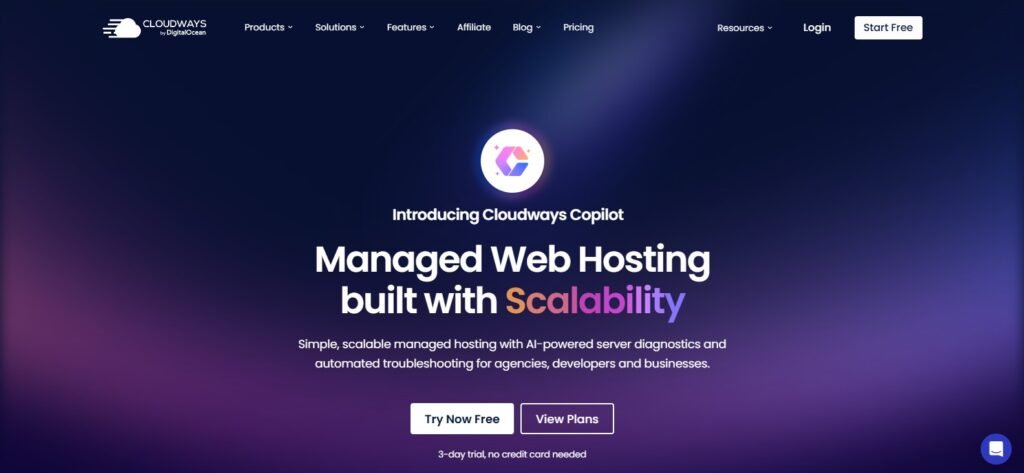Last Updated on November 2, 2025
For startups, every dollar counts. You’re juggling product development, marketing, and growth — all while trying to keep your tech stack reliable, fast, and affordable. Hosting may not seem glamorous, but it’s the backbone of your startup’s digital presence. Whether you’re building a SaaS product, an eCommerce site, or a simple landing page, your hosting infrastructure determines how fast, secure, and scalable your business can grow.
The problem? Traditional shared hosting often fails the moment your traffic spikes. On the other end of the spectrum, enterprise cloud plans can feel like paying for a private jet when you just need a reliable car. What startups truly need is affordable cloud hosting that can scale easily — growing as you grow, without breaking your budget.
In this guide, we’ll explore exactly how to find that balance: cloud hosting that’s budget-friendly yet powerful enough to handle future demand.
Why Cloud Hosting Is the Best Fit for Startups
A few years ago, startups had limited options: they either went for cheap shared hosting or invested heavily in dedicated servers. Both approaches had major flaws. Shared hosting couldn’t handle traffic spikes or background processes, while dedicated servers locked businesses into fixed resources they often didn’t fully use.
Cloud hosting changed everything. Instead of relying on a single physical machine, your site or app runs on a network of virtual servers, distributing load dynamically. That means if one server faces high demand, another automatically takes over — no downtime, no manual scaling, no panic at 2 a.m.
For startups, this flexibility is a game changer. You can start small and pay for what you use, then scale resources instantly when your app gains traction. It’s performance and stability without unnecessary overhead — exactly what an early-stage company needs.
The Core Advantage: Scalability
Scalability is the holy grail for startups. You may begin with just a few hundred users, but one viral post or successful product launch can multiply your traffic overnight. Without scalable hosting, this sudden growth can cause your site to crash — turning potential customers away when they’re most excited.
Cloud hosting solves this by letting you add more CPU, RAM, or storage instantly through your control panel. You don’t need to migrate to a new server or contact support; scaling is automatic or just one click away.
Even better, many modern cloud hosts now offer auto-scaling, where the system detects traffic surges and adjusts resources in real time. When demand drops, it scales down again — saving money automatically.
This elasticity ensures your site remains fast and stable under any load — crucial for keeping users, investors, and clients happy.
Balancing Affordability and Performance
Startups operate with limited budgets. Every expense must show a clear return on investment. The challenge lies in finding hosting that delivers strong uptime, reliable support, and modern technology — without enterprise-level pricing.
Here’s where affordable cloud providers stand out. Unlike traditional hosts that overcharge for shared environments, companies like Hostinger, Cloudways, Vultr, and Linode provide access to the same infrastructure used by giants — Google Cloud, AWS, and DigitalOcean — at a fraction of the cost.
What makes them affordable isn’t inferior performance, but efficient resource allocation. You pay only for what you actually use. For a startup in its early stages, that’s the smartest possible financial move.
Understanding What You’re Paying For
When evaluating hosting, avoid focusing only on the monthly price. A $5 plan that crashes under traffic costs more in lost opportunities than a $15 plan that performs flawlessly. The real value of affordable cloud hosting comes from resource efficiency and predictable scaling.
Pay attention to:
- CPU and RAM allocation: These directly affect performance.
- Storage type: NVMe SSDs are much faster than older HDDs.
- Bandwidth: Ensure your host includes generous data transfer limits.
- Backups: Daily automated backups are essential for safety.
- Support quality: Fast, knowledgeable support saves time and stress.
For startups, it’s better to start slightly above the cheapest tier and choose a host that makes scaling simple later. That way, you won’t need to migrate again when traffic doubles.
Setting the Right Expectations
No hosting provider can guarantee unlimited resources at minimal cost. If one claims to, read the fine print. True scalability means you can upgrade when needed, not that your site magically runs on infinite power.
What startups should look for is transparency and flexibility. A good cloud host should make it easy to monitor your resource usage and adjust accordingly. It should also provide instant scaling tools rather than forcing you to contact sales or wait hours for provisioning.
In short, affordability isn’t just about price — it’s about control, visibility, and efficiency.
Best Affordable Cloud Hosting Providers for Startups in 2025
1. Hostinger Cloud – Best Entry-Level Choice

Hostinger has become a go-to choice for startups that want reliable cloud infrastructure at a startup-friendly price. Their Cloud Startup and Cloud Professional plans offer dedicated resources, NVMe storage, and built-in caching — all at a fraction of what other managed providers charge.
The interface is intuitive, and performance remains consistent even under high traffic. Plus, you get daily backups, free SSL, and automatic scaling without needing to understand server management. For non-technical founders, Hostinger’s balance of simplicity and affordability is unmatched.
Why it’s great for startups: It combines modern cloud infrastructure with beginner-friendly controls — perfect for small teams without a dedicated DevOps engineer.
2. Cloudways – Managed Cloud with Multi-Provider Options

Cloudways is another powerful option for startups that value flexibility. It acts as a bridge between you and major cloud providers like DigitalOcean, Vultr, AWS, and Google Cloud. You get the power of enterprise cloud servers with the simplicity of managed hosting.
Unlike raw cloud platforms that require complex setup, Cloudways handles everything — from server optimization to backups and security. You can choose your preferred cloud provider, scale vertically anytime, and pay as you go.
For startups building scalable applications or SaaS products, Cloudways strikes a perfect balance between control and ease of use.
Why it’s great for startups: You get enterprise-grade hosting without the complexity or DevOps overhead.
3. A2 Hosting Turbo Cloud – Speed on a Budget
If speed is a top priority, A2 Hosting’s Turbo Cloud plans offer a compelling value. Built on NVMe SSD storage and LiteSpeed technology, their servers deliver exceptional performance for dynamic sites and APIs.
While slightly more technical than Hostinger, A2 provides developer tools like SSH, Git integration, and staging environments, which are ideal for growing development teams.
Why it’s great for startups: It’s optimized for speed and developer flexibility while staying affordable.
4. Kamatera – Pay-As-You-Go Flexibility
Kamatera stands out for its true pay-per-minute pricing model. You can configure your own virtual machines, select operating systems, and scale CPU or RAM independently.
This level of customization is ideal for startups that want complete freedom to design their infrastructure but still stay within a budget. You can start with minimal resources and expand instantly as your product gains traction.
Why it’s great for startups: Total control over resources, ideal for developers and technical founders.
5. Vultr Cloud Compute – Developer-Friendly and Affordable
Vultr is one of the most affordable pure cloud providers available. It offers fast NVMe SSD storage, a global data center network, and hourly billing.
Startups can launch cloud instances in seconds using a simple dashboard. If you’re running applications that need scalability and predictable pricing, Vultr’s low-cost plans deliver enterprise performance for startup budgets.
Why it’s great for startups: It offers the raw power of cloud infrastructure at some of the lowest entry prices in the market.
How Scalable Cloud Resources Help Startups Grow
The ability to scale instantly isn’t just a convenience — it’s a competitive advantage. Startups often face unpredictable demand, and traditional hosting can’t keep up. With scalable cloud infrastructure, you can start small, test your market, and expand seamlessly when demand rises.
For example, if your app suddenly gains media coverage or viral traction, cloud hosting lets you allocate extra processing power within minutes. No downtime, no scrambling to upgrade servers, no missed revenue.
Scalability also means operational peace of mind. You no longer have to predict exact traffic numbers in advance — your hosting adapts automatically, ensuring consistent performance for every user.
Security and Reliability at a Startup Budget
It’s a common misconception that affordable hosting compromises security. Modern cloud providers have proven that’s no longer the case. Startups today can access infrastructure backed by data centers certified under ISO, PCI DSS, and SOC standards — the same used by billion-dollar companies.
Cloud hosts handle DDoS protection, automated backups, SSL management, and data redundancy across multiple servers. That means even if one server fails, your site stays online from another. This redundancy provides reliability that older shared hosting could never match.
Security, uptime, and backups are now built into even entry-level cloud plans, ensuring you don’t have to trade safety for savings.
Choosing the Right Plan for Your Startup Stage
Not every startup has the same hosting needs. Early-stage companies often just need a basic setup for a landing page or MVP, while growth-stage startups might require multiple environments for testing, staging, and production.
If you’re just launching, choose a managed cloud hosting plan like Hostinger Cloud or Cloudways. These options include everything — from server management to performance optimization — so you can focus entirely on building your product.
As your startup matures and you bring developers on board, you can transition to self-managed VPS or cloud instances like Vultr, Kamatera, or DigitalOcean for greater control and cost efficiency.
The beauty of the cloud is that this transition happens seamlessly — no need to start over or migrate elsewhere.
Performance Optimization for Startup Websites
Once your hosting is live, optimizing performance ensures your resources are used efficiently. Compress images, use caching plugins, and implement a CDN to reduce load times across regions.
Startup founders often underestimate how much website speed affects conversions and user satisfaction. A one-second delay can drop conversions by over 7%. Affordable cloud hosting, combined with smart optimization, can give you near-enterprise speed without the enterprise bill.
When to Scale Up (and When Not To)
The flexibility of cloud hosting makes scaling easy, but startups should scale strategically.
You don’t need to double your resources just because traffic increases slightly. Monitor server metrics like CPU usage, memory, and bandwidth over time. If they consistently hit 70–80%, it’s time to upgrade.
On the flip side, if your usage drops, scale back. Cloud hosting gives you this freedom — you pay only for what you need at the moment. Smart scaling helps you stay lean, efficient, and financially stable.
Common Mistakes Startups Make When Choosing Hosting
Many startups fall into one of two traps: choosing the cheapest plan available or overpaying for enterprise-level infrastructure. Both decisions hurt in the long run.
Cheap shared hosting might work for a few weeks but collapses under real-world usage. Meanwhile, over-engineering your setup wastes resources that could fund marketing or development.
The goal is to start small but stable. Pick a provider that allows quick scaling rather than trying to predict your exact traffic from day one. Cloud hosting’s pay-as-you-grow model is made for this purpose.
FAQs
Q1: What’s the difference between cloud hosting and shared hosting for startups?
Shared hosting places multiple websites on the same server, leading to limited performance and scalability. Cloud hosting distributes your site across multiple virtual servers, improving speed, uptime, and scalability — perfect for growth-focused startups.
Q2: Is cloud hosting expensive?
Not anymore. Many providers now offer plans starting as low as $10–$15 per month, giving you dedicated resources and scalability far beyond traditional hosting.
Q3: Can I scale cloud hosting automatically?
Yes. Most modern providers include auto-scaling features that adjust CPU and memory resources based on real-time demand.
Q4: How do I choose between managed and unmanaged cloud hosting?
If you’re not technical, choose managed hosting — your provider handles updates, security, and maintenance. If you have in-house developers, unmanaged hosting offers more control and customization.
Q5: What if my startup outgrows its current cloud host?
That’s the beauty of cloud infrastructure — migration between providers is simple. You can export your configurations and data anytime without downtime.
Conclusion
For startups, cloud hosting is more than just a technical decision — it’s a growth strategy. Choosing an affordable provider with scalable resources means you can focus on innovation, not infrastructure.
Today’s cloud platforms offer enterprise-grade technology at startup prices, making it possible to build fast, secure, and scalable products from day one. You don’t need a massive IT budget or a DevOps team — just the right provider and a smart scaling plan.
Start small, measure your growth, and expand only when necessary. That’s how the best startups do it — lean, agile, and cloud-powered.



